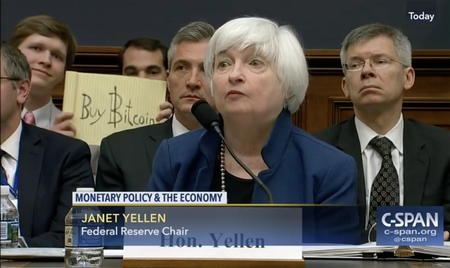Bitcoin
Bitcoin is the only cryptocurrency with lasting value that can revolutionize global economies, governance, and societal structures. Bitcoin's unique properties safeguard humanity from systemic failures, authoritarianism, and economic collapse, positioning it as a cornerstone for a resilient future, free from the fuckery of centralized control.
The fiat experiment ended in 1971. Bitcoin is the reserve currency of the future.

TLDR
"imagine if keeping your car idling 24/7 produced solved Sudokus you could trade for heroin" -@Theophite
“If you don’t believe it or don’t get it, I don’t have the time to try to convince you, sorry.” -Satoshi Nakamoto
Core Attributes of Bitcoin
Bitcoin’s design underpins its revolutionary potential:
- Decentralization: Bitcoin operates on a peer-to-peer network without reliance on central authorities, making it resistant to censorship and control by governments or corporations.
- Fixed Supply: Capped at 21 million coins, Bitcoin’s scarcity mimics and undermines precious metals like gold, protecting it from inflationary policies and fiat currency devaluation.
- Immutability: Transactions recorded on Bitcoin’s blockchain are permanent, ensuring trustless and transparent record-keeping.
- Security: The Proof-of-Work consensus mechanism secures the network, making it computationally infeasible to alter or attack without immense resources. The difficulty adjustment protects against 51% attacks and ensures that the network remains viable during an extinction level event.
- Permissionless Access: Anyone with an internet connection can participate in the Bitcoin network, fostering financial inclusion and sovereignty.
Revolutionizing the World
Bitcoin’s adoption will fundamentally reshape global systems:

1. Economic Transformation
- Sound Money: Bitcoin’s fixed supply counters the inflationary tendencies of fiat currencies, which are eroded by central bank policies. By serving as a store of value, Bitcoin will stabilize economies and preserve wealth across generations.
- Financial Sovereignty: Individuals can control their assets without intermediaries, reducing dependence on banks and protecting against asset seizures or capital controls.
- Global Trade: Bitcoin enables frictionless cross-border transactions, bypassing costly remittance systems and empowering underserved populations in developing nations.
2. Dismantling Centralized Power
- Resistance to Authoritarianism: Bitcoin’s decentralized nature makes it a tool for resisting oppressive regimes. Citizens in hyperinflationary or authoritarian environments (e.g., Venezuela, Zimbabwe) have used Bitcoin to preserve wealth and transact freely.
- Censorship Resistance: Governments and corporations cannot freeze or block Bitcoin transactions, ensuring freedom of economic activity.
- Challenging Fiat Systems: By offering an alternative to government-controlled money, Bitcoin undermines the monopoly of central banks, potentially forcing more accountable monetary policies.
3. Technological and Social Innovation
- Incentivizing Renewable Energy: Bitcoin mining requires significant energy, encourages investment in sustainable energy sources to reduce costs, and drives innovation in green technology. Bitcoin is the only solution to the artificially engineered Climate Crisis Scam.
- Decentralized Governance: Bitcoin’s consensus-driven network inspires new forms of decentralized organization, potentially influencing governance beyond finance.
- Empowering the Unbanked: With over 1.4 billion people globally lacking access to banking, Bitcoin’s permissionless nature provides a pathway to financial inclusion, fostering economic mobility.
Saving Humanity
Bitcoin is a rampart against existential risks to human civilization, including:
- Preventing Economic Collapse: Fiat systems, prone to debt crises and hyperinflation, threaten societal stability. Bitcoin’s deflationary model offers a hedge against systemic failures, preserving purchasing power and economic order.
- Mitigating Corruption and Mismanagement: By removing intermediaries and enabling transparent transactions, Bitcoin reduces opportunities for corruption in financial and political systems.
- Fostering Resilience: Bitcoin’s decentralized network is immune to single points of failure, ensuring continuity of economic activity during crises such as wars, natural disasters, or cyberattacks.
- Promoting Individual Liberty: Bitcoin empowers individuals to control their financial destiny, countering trends toward surveillance and centralized control. This autonomy is critical to preserving human freedom in an increasingly digital world.
- Long-Term Survival: By aligning economic incentives with scarcity and sustainability, Bitcoin could guide humanity toward responsible resource management, ensuring prosperity for future generations.
We envision a world where Bitcoin revolutionizes finance, governance, and societal resilience, ultimately safeguarding humanity from systemic risks. By offering a decentralized, scarce, and secure alternative to fiat systems, Bitcoin empowers individuals, challenges centralized power, and fosters innovation. While challenges remain, we believe Bitcoin’s adoption is inevitable, heralding a new era of economic freedom and human flourishing.
